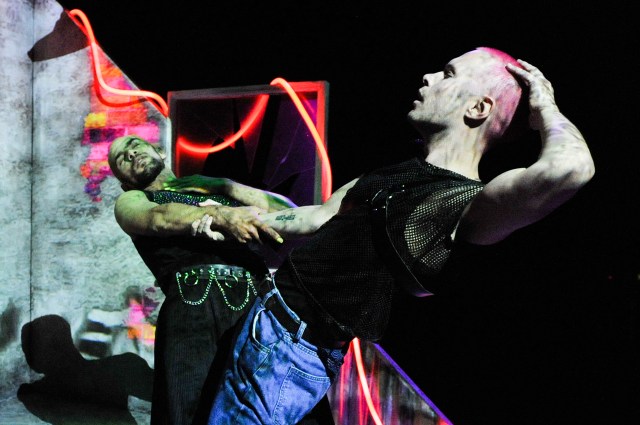Toxic at HOME Manchester – review
The Dibby Theatre production continues until 28 October ahead of a UK tour

It’s not the arrival of Britney Spears’s song that surprises, but how it sounds. Recognisable, at first. Then it gets woozy as an off-kilter remix kicks in. It introduces a play that writer Nathaniel J Hall begins by listing everything it won’t be: stereotypically ‘gay’, trauma-flaunting, shame-reinforcing. A smashed window seems to stress the point about what he intends to do to stigmas.
Lu Herbert’s set succinctly expresses the idea of resisting shame. A cramped room with craggy walls – is it shelter or wreckage? Neon bricks peer through grey concrete – breaking through or being covered up? A split down the middle is yanked open when the two partners in the relationship separate.
Hall’s semi-autobiographical piece recounts how that happened. Microphones add to the confessional style, although it occasionally feels like a catalogue of experiences that are shared declaratively with less reflection. While director Scott Le Crass breaks it up with movement and stage reconfigurations, it never settles on a way to tell the story. A jumble of abstract poetry bursts, flippant stand-up, domestic naturalism, dance and physical theatre sequences.
Hall cradles it tightly and doesn’t totally trust us to find our way, overly keen to signpost upcoming developments and follow them up by telling us they’re sorrowful. The first-person switches, and a moment where he quite literally points out the scars it’s left behind, feel intrusive and undercut his desire to universalise the experiences, explained at the start as the reason for naming the characters ‘Performer’ and ‘Playwright’.
Despite this slight singularity of focus, Hall’s play manages to say a lot about intersectionality. Josh-Susan Enright’s character is discriminated against both for their sexuality and race, slurred as “dirty” in both contexts. Hall’s, meanwhile, faces internalised homophobia and HIV phobia within the community – an LED tube resembles a vein that snakes around the stage as his positive diagnosis coils around him.
Hall’s feather-light voice suggests he’s pushed so much down there’s little left on the surface. The weakness works in moments of vulnerability, but he feels too timid overall. He doesn’t match the emotional and vocal range of Enright, whose voice and presence are stronger. Enright turns this dynamic on their partner in a quietly unsettling moment of dominance, silently holding their phone out of reach, face clenched, like a stern parent or school bully.
Some of the originality of Hall’s voice is held back by cliché. There are regular insistences that they’ve got each other for eternity, that “we’re broken but we can fix us”, and baggage is always qualified with “maybe that’s OK”. It’s best when it’s less self-conscious, so messages about survival and fortitude surface fortuitously. Like one of its final moments: the two characters telling us they’re broken, fallen apart – seemingly unaware, though we’re not, that they’re saying this stood together, side by side.















